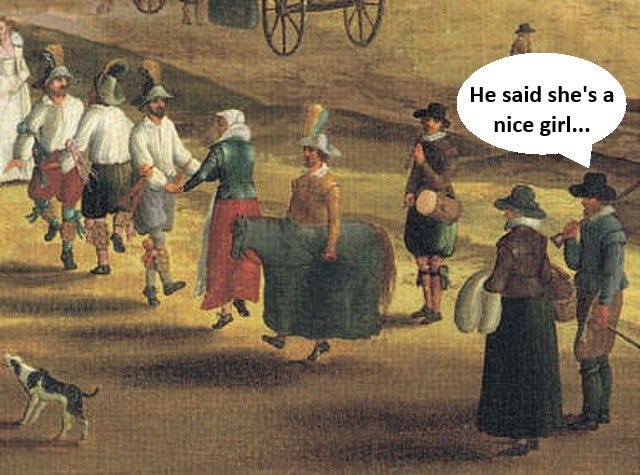What's wrong with the word 'bucolic'?
#16—And why do so many people think it's a disease?
Welcome to Mind Flexing, your weekly thought expedition to everywhere and anywhere. Strap on your boots (or put your feet up), take a deep breath, and let’s get flexing.
I live in a region that is the very definition of bucolic. The mountains of Victoria’s High Country are topped with bush that cascades down the slopes to where, midway, the foliage ends in precision lines, shaved with a giant razor along the hillsides to reveal the orderly and lush green paddocks beneath. The manicured green rolls along the river valleys as far as the eye can see. Cows, sheep and horses spend their days wandering the grasses, joined by kangaroos in the crisp mornings and lazy afternoons. Locals swap eggs from their own chickens with fruits and vegetables from their neighbours’ gardens. Nuts are plentiful. It’s the quintessential pastoral image; it’s bucolic.
Dictionary definitions of bucolic differ, but they generally agree that the adjective is ‘relating to the countryside’. Some mention it as idyllic or rustic, and it’s often linked to its Greek origins, boukolikos, meaning cowherd or herdsman.1
Now, some of you reading this will not have flinched, but I hazard a guess that many of you will likely have contorted your faces. Bucolic isn’t very popular. In fact, a client I once wrote for asked me not to use such a “horrible word”.
I’ve since observed that many link it to some sort of sickness or disease, or something distasteful, and searching online prior to writing this, I found I am not alone in making this observation.
Language is a wonderful thing; it morphs with the times, words take on new meanings, old meanings are lost, new words emerge, others disappear.
Take for instance the word ‘nice’. It didn’t always mean something pleasant, enjoyable, or satisfactory, or someone kind, friendly or polite.2 Rather, it meant foolish, ignorant, frivolous, and senseless.3 Such changes in meaning are common, but what’s interesting about bucolic is that it hasn’t changed its meaning at all. So that got me thinking, what is it about a word, which in this case has such a pleasant meaning, that causes many to associate it with something distasteful.
Phonetically pleasant words
Perhaps bucolic just sounds wrong. Carmen Álvarez-Mayo, Lecturer in Spanish at University of York, says in an article in The Conversation that research shows English speakers respond favorably to two and three syllable words with short vowels and consonantal sounds that are easy to pronounce, such as ‘l’, ‘s’, and ‘m’.
Examples of these words, with phonemes that roll off the tongue, are: autumn, melody, lullaby, velvet, luminous, tranquil, marigold, whisper, gossamer, and caress. Bucolic, while it half fits the bill, doesn’t carry the same softness.
Unsurprisingly, words with positive connotations were also viewed favourably. Álvarez-Mayo says:
“We all perceive words in different ways. How we feel about different words, whether we like the sound of some of them more than others, will depend mostly on what experiences in our life we attach to them and how people in our community use those words.”
Word association
Which brings us to word association. Bucolic isn’t a widely used word, with only about 0.4 uses per million words.4 When a person hears an unfamiliar word for the first time, in the absence of a definition, the word forms associations or connotations in that person’s mind, and these associations and connotations will differ depending on the individual’s experiences.
And here I have a theory about the word bucolic.
Overwhelmingly, many who dislike the word seem to associate bucolic with a sickness or virus. I suspect this is due to the listener’s first encounter with the word in which associations were formed with the word ‘colic’—prolonged crying in an agitated baby for reasons rarely discernable—or ‘bubonic’—as in the bubonic plague, characterised by swollen inflamed lymph nodes in the armpit or groin. Both these associations have negative connotations far from the pleasant pastoral scene the word represents.
To use or not to use?
So where does that leave us? Should we curtail to the reasonably large negative perception of the word bucolic and refrain from using it? Or should we seek to rectify its meaning by using it all the more? I quite enjoy slipping it in whenever an opportunity arises, and hope that somewhere, someone winces. I’m interested in your thoughts.
What other words are on the nose?
Have you come across other words that are widely disliked? Share them with us in the comments.
Things I’ve enjoyed on Substack this week
Leave to Remain - Tragicomedy Short Film—by Remy Bazerque
A powerful short film, just over 10 minutes long, with an ending that will leave you laughing, despite the heavy topic that explores how people behave when they feel they are treated like dogs.
Postcards from the Open Road: Sunrise on John Muir’s Farm—by Tom Ryan
Tom shares some scenes from a sunrise on John Muir’s farm. It was lovely to see the vantages this famous naturalist and environmental conservationist once observed.
Never Be Ordinary: Interview with Jess Pan—by Jane Ratcliffe
Jane delves into a Q&A with Jess Pan, the introverted author with a big personality.
Thank you for Mind Flexing with me. If you enjoyed this essay, please subscribe, comment below, click the ❤️ button, or share it with someone you think would appreciate it.
I’ll be back next week. Until then, keep 💪.





Oh what fun to find you! Two language nerds in a pod, or something. One of my subscribers and a fellow Substacker, @alanasnen, brought this to my attention. I *love* the word "bucolic" and have never thought ill of the poor dear, drifty and languorous as it has always been to my mind. I think you are 100% dead on about associations with "colic" and "bubonic." Poor, lovely word, desecrated by ignorance. I will use it more often!
I am fine with the word 'bucolic' and have even been known to use it myself because was the right word at the time. Don't give up - we need words like this.